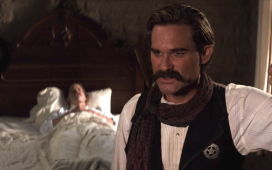Izabela Kiszka’s boutique sales agency IKH Pictures Promotion has boarded hostage thriller “Prime Time,” which will have its world premiere in Sundance Film Festival’s World Cinema Dramatic Competition section. The Polish film stars Bartosz Bielenia, who broke through in Oscar nominated “Corpus Christi.” Variety spoke to director Jakub Piątek about his debut feature.
“Prime Time,” cowritten by Piątek and Łukasz Czapski, takes place on the final day of 1999. Twenty-year-old Sebastian locks himself in a TV studio in Poland, and takes two people – a celebrity presenter, played by Magdalena Popławska, and a security guard, played by Andrzej Kłak – hostage at gunpoint. The young man demands to be allowed to broadcast a statement to the nation, but has to negotiate with the police and the broadcaster.
Kiszka, who founded IKH Pictures Promotion in 2018 to support emerging young talent, described the film as “powerful and timely.” She said: “The pandemic and global lockdowns have left us all craving character-driven stories we can identify with and ‘Prime Time’ does that and more. It perfectly captures our zeitgeist.”
Sebastian is “driven” by the need to appear on live television and talk to the world, and needs the viewers to “complete himself,” Piątek told Variety. He is a “mystery,” he said, with snippets of information about the hostage-taker revealed as the police struggle to get inside his mind, and defuse the situation, leaving the film’s audience to come to their own conclusions. “Our ambition is that, after watching the film, these interpretations of our hero would be as different as the viewers themselves,” Piątek said.
Speaking about the casting process, he said: “While casting actors and actresses I wait for the ‘click’ – it can be a small gesture, or just a word – something that takes a character out of the script and makes it credible; the character suddenly exists.”
This is what happened during the casting of Bielenia, Piątek said. “Bartosz took me during those first hours to areas that I did not know yet. He has filtered what he has read and heard through himself, and a new quality appeared. I would always like to work with actors this way – treat them as partners and co-creators, not performers.”
The film’s genesis came out of his discussions with Czapski around the subject of rebellion, which Piątek saw as lacking “both around us and in ourselves.” While “fantasizing” about rebellion, they came across a story about an attack on a television channel in the U.S., then found similar cases in several other countries, including Poland. “It was young men who most often carried out the attacks. The Polish attempt to get on the air had the mystery of what the guy wanted to say,” he said. This triggered a curiosity in them and “a search for meaning” that Piątek wanted to include in the script “since it triggered [this response in us], we believed that it would also act as a dramatic story engine from the viewer’s perspective.”
During the film, we see the hostages and Sebastian develop a bond, similar to Stockholm Syndrome, but there’s something more nuanced to it than that. “During the work on the script and then during the rehearsals […] it was fascinating to observe the relationship between them. These people would [usually] never meet, they are from different worlds, and suddenly they end up together, locked up, at gunpoint. Extreme situations intensify the experience and relationships,” Piątek said.
The action takes place in a time before social media when television had huge power and fascination for people. “We set the film 20 years ago because then television was the main medium,” Piątek said. “It was extremely exclusive and difficult to get into. Even the employees who did not appear in front of the cameras were beneficiaries of a better world. At that time, Poles watched TV an average of four hours a day; it was television that shaped us as a society. What could be a better place to say something very important to the world? Of course, now all this has weakened, it’s not that important anymore – to some extent it has become democratized, yet somehow, I look with nostalgia in that direction. At the same time, television still has power, especially when managed by politicians.”
This is particularly pertinent in Poland, where the coalition government, led by the ultra conservative Law and Justice Party, has a firm grip on the public broadcaster, TVP, making it a mouthpiece for their views.
The eve of the new millennium is seen by the director as a “breakthrough moment.” “One felt that the world could change,” he said. “The artificially inflated specter of the Millennium Bug hung over mankind. After midnight, computers were to go crazy, ATMs would spew out money, power plants would stop working, planes would go down and the stock market and credit records would be wiped out. On top of that, the biggest celebrations, entering the New Year with a bang, fireworks, international stars on stage and TV, and lots of alcohol. It seemed to be the perfect backdrop for our little drama.”
The film was produced by Jakub Razowski at Watchout Studio, the producer of Polish box-office hit “The Art of Love,” and was supported by the Polish Film Institute, private broadcaster TVN and Krakow Festival Office. It will be released in Poland this year by Next Film.
Piątek, a Lodz Film School graduate, had an early success in 2009 with short documentary “Mother,” which screened at more than 50 international film festivals. His mid-length documentary “One Man Show” premiered at DOK Leipzig Film Festival in 2014, and his short film “Users” played at Slamdance Film Festival in 2019.
IKH Pictures Promotion’s acquisitions include “Love Tasting” by Dawid Nickel, which won best film in the Microbudget Film Competition at Gdynia Film Festival; “Erotica 2022” by Anna Jadowska, Anna Kazejak, Olga Chajdas, Kasia Adamik and Jagoda Szelc; and Sylwester Jakimow’s first feature “We Will All Be Fine.”








